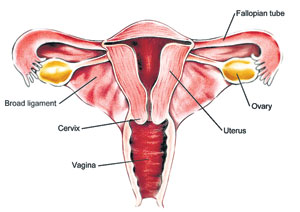
PCOS: Importance of early interventionMissed a period for a few months running or only had patchy, irregular flow? Having trouble getting pregnant? Take the time to visit a doctor and find out what's behind it. Environmental pollution and stress may be leading factors contributing to the increasing incidence of polycystic ovarian syndrome (PCOS) in Asian women, a condition that is linked to infertility, obesity and even diabetes, says Dr. Nalinda Rodrigo, consultant obstetrician and gynaecologist. This month in Mediscene he talks about the causes of this chronic condition and the importance of early intervention. What is polycystic ovarian syndrome? A clue lies in the word polycystic itself - it literally means many cysts. While the formation of a few cysts is a normal part of the maturation and release of eggs within the ovaries, in PCOS egg follicles that have not matured properly can result in the appearance of lots of tiny cysts just beneath the surface of the ovary. The condition is accompanied by imbalances in hormone levels.
A doctor examining a woman with PCOS will find that her ovaries are bigger than average while the outer surface is covered in a number of small follicles consisting of sacs of fluid that usually surround the egg for protection. However, in PCOS, these follicles never attain maturity and as a result do not produce an egg that can be fertilized. For women, this translates into decreased fertility due to decreased ovulation. In addition, their menstrual cycles become irregular and unpredictable. The condition may be accompanied by other features like excess weight and body hair. Young women between the ages of 15 - 35 are most commonly affected by PCOS. The patient's medical history, symptoms and physical appearance, along with blood tests and an ultra sound can be used to diagnose PCOS. What causes PCOS? Recent research has identified stress and environmental pollution as possible causes for PCOS. The condition also seems to run in families and as such may be influenced by the genes we inherit from our parents. PCOS has also been found often in women who are overweight or obese, who smoke, have a family history of diabetes or even a close female relative with the same condition. What are the symptoms? The ways in which PCOS shows itself include:
Treatment - work with your doctor to get better Lifestyle changes may help you get PCOS under control. Weight loss, changes to diet and a healthy exercise regime will give you the double benefits of getting your PCOS in hand, even as you enjoy a reduced vulnerability to diabetes and heart disease. Weight loss: In obese patients with PCOS, significant improvement in symptoms can be achieved with a reduction in bodyweight, following which regular menses and ovulation may return. Menstrual disturbance: Menstrual disturbances can be managed with cyclic progestagens or a combined oral contraceptive pill for a limited period of time. Hirsutism and Acne: Hormone treatments may be recommended. In addition, cosmetic therapies like waxing and bleaching should also be encouraged. Subfertility: a doctor will prescribe drugs such as anti-oestrogens or gonadotrophins in an attempt to induce ovulation. Hyperinsulinaemia: The elevated insulin levels seen in many patients with PCOS must be treated. Doctors may consider employing anti-diabetic medications like Metformin. |
|
||||||
|| Front
Page | News | Editorial | Columns | Sports | Plus | Financial
Times | International | Mirror | TV
Times | Funday
Times | Medi Scene || |
| |
Reproduction of articles permitted when used without any alterations to contents and a link to the source page.
|
© Copyright
2008 | Wijeya
Newspapers Ltd.Colombo. Sri Lanka. All Rights Reserved. |
